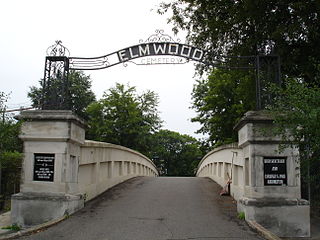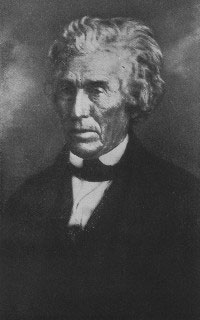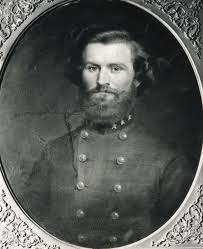
Clarksville is the county seat of Montgomery County, Tennessee, United States. It is the fifth-largest city in the state, after Nashville, Memphis, Knoxville, and Chattanooga. The city had a population of 166,722 as of the 2020 United States census.

Mount Holly Cemetery is a historic cemetery located in the Quapaw Quarter area of downtown Little Rock in the U.S. state of Arkansas, and is the burial place for numerous Arkansans of note. It was listed on the National Register of Historic Places in 1970 and has been nicknamed "The Westminster Abbey of Arkansas".

The Battle of Nashville was a two-day battle in the Franklin-Nashville Campaign that represented the end of large-scale fighting west of the coastal states in the American Civil War. It was fought at Nashville, Tennessee, on December 15–16, 1864, between the Confederate Army of Tennessee under Lieutenant General John Bell Hood and the Union Army of the Cumberland (AoC) under Major General George H. Thomas. In one of the largest victories achieved by the Union Army during the war, Thomas attacked and routed Hood's army, largely destroying it as an effective fighting force.

Lieutenant-General Leonidas Polk was a bishop of the Episcopal Diocese of Louisiana and founder of the Protestant Episcopal Church in the Confederate States of America, which separated from the Episcopal Church of the United States of America. He was a planter in Maury County, Tennessee, and a second cousin of President James K. Polk. He resigned his ecclesiastical position to become a major-general in the Confederate States Army, when he was called "Sewanee's Fighting Bishop". His official portrait at the University of the South depicts him as a bishop with his army uniform hanging nearby. He is often erroneously referred to as "Leonidas K. Polk," but he had no middle name and never signed any documents as such.

Hollywood Cemetery is a large, sprawling cemetery located next to Richmond, Virginia's, Oregon Hill neighborhood at 412 South Cherry Street. Characterized by rolling hills and winding paths overlooking the James River, it is the resting place of two United States Presidents, James Monroe and John Tyler, as well as the only Confederate States President, Jefferson Davis. It is also the resting place of 28 Confederate generals, more than any other cemetery in the country; these include George Pickett and J.E.B. Stuart.

Mount Olivet Cemetery is a 206-acre (83 ha) cemetery located in Nashville, Tennessee. It is located approximately two miles East of downtown Nashville, and adjacent to the Catholic Calvary Cemetery. It is open to the public during daylight hours.

Benjamin Franklin "Frank" Cheatham was a Tennessee planter, California gold miner, and a general in the Confederate States Army during the American Civil War. He served in the Army of Tennessee, inflicting many casualties on Gen. Sherman at Kennesaw Mountain, Georgia, but taking the blame for General Schofield's escape at Spring Hill, Tennessee – a major factor in the Confederate defeat at Franklin, Tennessee.

Nutbush is a rural unincorporated community in Haywood County, Tennessee, United States, in the western part of the state, approximately 50 miles northeast of Memphis. It was established in the early 19th century by European-American settlers who bought enslaved African Americans to develop the area's cotton plantations. The houses and churches that were built during this time still stand.

Elmwood Cemetery is the oldest active cemetery in Memphis, Tennessee. It was established in 1852 as one of the first rural cemeteries in the South.

William Hawkins Polk was an American politician and a member of the United States House of Representatives for Tennessee's 6th congressional district from 1851 to 1853. He was the younger brother of President James K. Polk. Prior to his election to Congress, he had been a member of the Tennessee House of Representatives (1841–1845), served as U.S. Minister to the Kingdom of the Two Sicilies (1845–1847), and fought as a major in the Mexican–American War.

The American Civil War significantly affected Tennessee, with every county witnessing combat. It was a divided state, with the Eastern counties harboring pro-Union sentiment throughout the conflict, and it was the last state to officially secede from the Union, in protest of President Lincoln's April 15 Proclamation calling forth 75,000 members of state militias to suppress the rebellion. Although Tennessee provided a large number of troops for the Confederacy, it would also provide more soldiers for the Union Army than any other state within the Confederacy.
Richard Franklin Bache, also known as Richard Bache Jr. (1784–1848), was a military and political official in the Republic and state of Texas. He assisted in drafting the Texas Constitution of 1845, the first of its five state constitutions.

Wilkins F. Tannehill (1787–1858) was an American Whig politician and author. He served as the Mayor of Nashville, Tennessee from 1825 to 1827.

Felix Robertson (1781–1865) was an American pioneer, physician and Jeffersonian Republican politician. He served twice as the Mayor of Nashville, Tennessee from 1818 to 1819 as well as from 1827 to 1829.
John Patton Erwin (1795–1857) was an American Whig politician. He served as the Mayor of Nashville, Tennessee from 1821 to 1822, and from 1834 to 1835.

Randal McGavock (1766–1843) was an American politician and Southern planter in Nashville, Tennessee. Identifying as a Jeffersonian Republican, he served as the Mayor of Nashville, Tennessee from 1824 to 1825.

Randal William McGavock (1826–1863) was an American lawyer, Democratic politician, Southern planter, and colonel in the Confederate States Army. He served as the Mayor of Nashville, Tennessee, from 1858 to 1859.
The following is a timeline of the history of the city of Clarksville, Tennessee, United States.

Elias Polk was a former enslaved African American, most known for being enslaved by President James K. Polk and his family from the time of his birth until emancipation in 1865. After the American Civil War, he became a conservative Democratic political activist, when most freedmen joined the Republican Party. As a person enslaved, Polk had lived and worked at the Polk farm in Maury County, Tennessee, in the Columbia, Tennessee home of James and Sarah Polk, in the White House in 1845, and the Polks' Nashville residence, "Polk Place" from 1849 to 1865. After the president died, Elias Polk continued to live at Polk Place in Nashville, where he continued to be enslaved by the widowed First Lady Sarah Childress Polk. Once Elias gained freedom, he embarked on a public speaking career which saw him take up the cause of the Democratic Party, and spoke on behalf of former Confederates and enslavers. This was done out of survival and economic stability. Elias is remembered today for his controversial stances and willingness to "play the part" of the faithful slave in order to subvert and mock the southern racial hierarchy to his advantage.

Samuel Polk was an American surveyor, slave owner, and the father of U.S. President James Knox Polk. His slaves included Elias Polk.

















